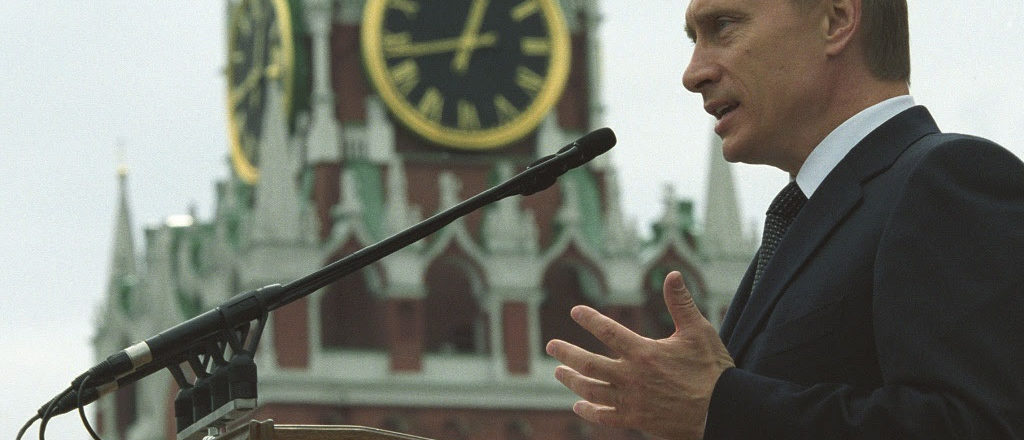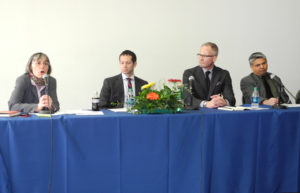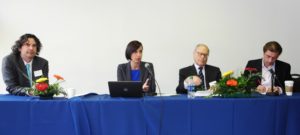A nation must think before it acts.
On April 11, 2016, the Foreign Policy Research Institute and the Transatlantic Academy of the German Marshall Fund collaborated with the University of Pennsylvania’s Perry World House, the Penn-Temple European Studies Colloquium, and the Atlantic Council’s Dinu Patriciu Eurasia Center in a day-long conference hosted as part of the Penn Slavic Department’s annual Slavic Symposium entitled “Russian Foreign Policy in the Putin Era.” Hosted by International House Philadelphia, the conference brought together an impressive array of leading scholars on Russian foreign policy to discuss Putin’s grand strategy and objectives, Russo-European relations, Russia’s oil and gas politics, and ways in which the West can work to counter Russia’s aggressive policies in its near abroad and beyond.
Panel 1 – Putin’s Grand Strategy and Objectives
Moderator: Mitchell Orenstein
In the first panel of the conference, the speakers addressed the question of Russian grand strategy, attempting to locate and define Russia’s motives and geopolitical objectives.
First, Agnia Grigas, Senior Fellow at the Atlantic Council, summarized the arguments developed in her new book, Beyond Crimea: The New Russian Empire (New Haven: Yale University Press, 2016). She argued that over the past 20 years, Russia has pursued a policy of “reimperialization” throughout the region of the former Soviet Union, using ethnic Russians and Russian speakers abroad as a means of expansion. Russia’s policy toward its “compatriots”—which, broadly defined, may include tens of millions of ethnic Russians as well as other former Soviet peoples and their descendants—calls for Russia to provide protection and support.
Grigas outlined the way Russia uses its compatriots abroad to gradually expand its territory. In her interpretation, expansion starts with soft power, using the Russian Orthodox Church and humanitarian organizations to raise the issue of supposed grievances or injustices against Russian compatriots, and promotes Russian identity and loyalty through compatriot organizations. Eventually comes a turning point—“passportization”—in which Russia hands out citizenship to its “compatriots” in the territories it is targeting. This citizenship then provides a clear basis in Russian law to intervene militarily if necessary on behalf of those citizens. This is often accompanied by an aggressive use of propaganda to justify such intervention. In the case of Crimea, this has proceeded to another stage: annexation.
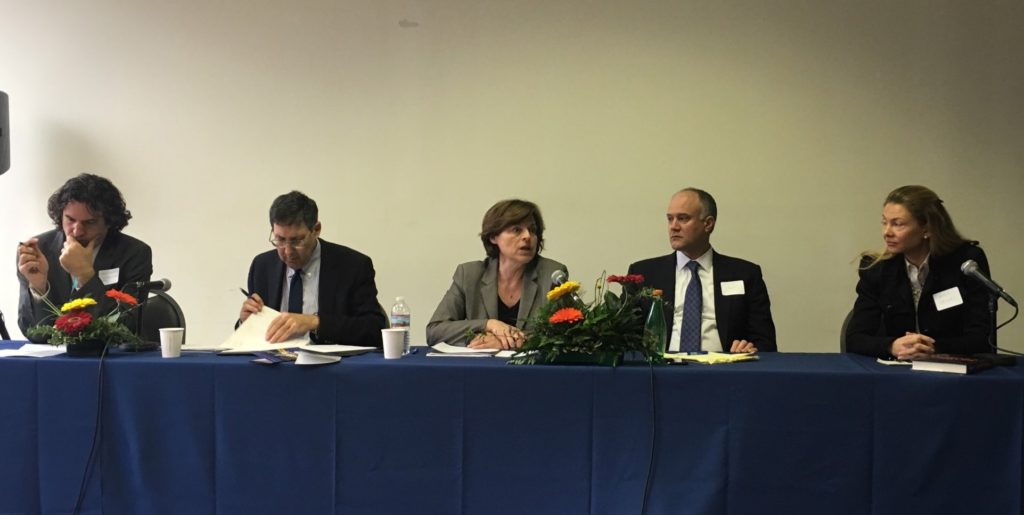
Herbst argued that this pattern of involvement in frozen conflicts should be of concern to the West because the Kremlin’s intentions appear to extend beyond the so-called “gray zone” of post-Soviet states located between Russia and the European Union. Putin’s statements and actions have implied that this strategy could also be applied to Kazakhstan or the Baltic countries. In order to manage this threat, Herbst argued that the West must maintain a strong presence in the Baltic states, shore up its presence in the Black Sea, and be willing and able to sustain or increase sanctions if necessary.
After Herbst, Marie Mendras, Professor of Political Science at Sciences Po and Senior Fellow at the Transatlantic Academy of the German Marshall Fund, presented the argument that Russia has been unsuccessful in achieving its core foreign policy goals. Russia’s leadership has three major ambitions. These include: 1) to be recognized as a great power; 2) to consolidate its sphere of influence; and 3) to keep Western states at bay.
Mendras detailed Russia’s failure on all three points. First, Russia’s actions in Ukraine have resulted in its expulsion from the G8, loss of the Russian delegation’s vote in the Council of Europe, failure to pass any Ukraine-related resolutions in the UN, and isolation from a number of other international organizations as well as a loss of trust from European countries. Second, Russia has decisively lost Ukraine outside of Crimea. Moreover, other countries in the “sphere of influence,” including Belarus and Georgia, did not react favorably to Russian actions in Ukraine. Third, instead of keeping the West at bay, Putin’s actions have increased the West’s partnership with Ukraine and have awakened it to the importance of pursuing relationships with states in the “gray zone” that were previously considered peripheral. Putin has been in “survival tactical mode” since the protests of late 2011 which challenged his power. The most he can do at this point is to act as a “spoiler” in Ukraine as much as possible. The best course for European states and the US is to focus on sanctions and on “damage control” in order to put pressure on Moscow.
The final speaker on the panel, Charles Ryan of Almaz Capital, provided a business perspective on Russia. He detailed his interactions with Putin in the pre-presidential days in St. Petersburg. Ryan came to understand Putin as a brilliant tactician driven by a desire to maintain power, and now, also by a larger goal: to recalibrate Russia’s position in the world after the collapse of the 1990s. This means making Russia a great power and getting rid of anything standing in its path. Practically speaking, this leads to efforts to divide the United States and Europe from each other, and to divide Europeans from each other. After his early presidency focused on domestic reform, Putin is turning more to propaganda to shore up his power as the Russian economy has slowed.
With regard to Ukraine, Ryan argued that Russia has never been completely comfortable with its sovereignty, because it is intertwined with Russia in a way distinct from any of the other post-Soviet states. He laid the blame for the Ukraine crisis more on the incompetence of Ukraine’s government and on the terms of the EU Association Agreement than on Putin, and argued that a more collaborative approach by the EU may have prevented this situation from growing into a crisis.
A lively discussion followed the panel, with questions focusing on a range of issues including the relative importance, of the EU-Russia and US-Russia relationships, the detrimental role of corruption in Ukraine, and the intentions of the Kremlin toward the Baltic states and to the West in general. Agnia Grigas and Ulrich Speck, a Senior Fellow at the Transatlantic Academy, defended the EU’s role in the Ukraine conflict. Speck pointed out that the Europeans had attempted to resolve issues surrounding the Association Agreement with Russia as early as the summer of 2013, but Russia was not interested. Likewise, Grigas explained that Russian efforts to coopt certain groups and interests to destabilize Ukraine began well before the Association Agreement. With regard to the issue of corruption, the speakers agreed it is a serious problem in Ukraine, but not an insurmountable one. John Herbst argued that while the top Ukrainian leaders are still products of the old communist system, many younger leaders are reformers, and Ukraine has a strong civil society. It is the responsibility of the West to support Ukraine’s progress, including with “tough love,” even if there are steps backward as well as forward. Marie Mendras pointed to political will in Ukrainian society as the crucial factor in overcoming corruption. However, she emphasized that the process of disentangling the country from corrupt Russian networks is a long-term effort that requires patience.
Keynote Speech – Unmasterable Pasts: History and Prophecy in Russian Strategy
Speaker: Timothy Snyder, Professor of History, Yale University
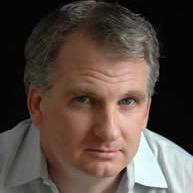
His conclusion was that Russia’s worldview can be understood within a “fascist framework” for geopolitics. In what way does the term “fascism” apply to Russia? Snyder asserted that fascism is a framework which is comfortable with the state not being the center of analysis, and comfortable with political interests being intangible or irrational. It also accepts disorder as a goal of foreign policy. In the context of Russia’s conflict with Ukraine, none of the parties involved are full-fledged states. For example, Ukrainians found their state to be inadequate and called on Europe for help in late 2013. The EU is also not a coherent state in the conventional sense. Likewise, Russia is unstable as a state because, as the disorder following the 2011 elections revealed, it has no clear principle of leadership succession.
In addition, Snyder showed that in response to the basic problem of succession within the Russian state, elites have been picking up on ideas from older fascist thinkers since at least the 1990s. Thus, fascism as an intellectual current is still developing inside of Russia. In particular, Snyder detailed the influence of philosopher Ivan Ilyin (1883-1954) on Putin and the Russian elite in general. Putin has shown great interest in Ilyin, for example, by having him reburied in 2005. Ilyin’s archive, previously in the United States, was returned to Russia in 2006. Finally, at key moments during the 2011 elections and the annexation of Crimea, Putin cited Ilyin’s works as part of the defense for his actions.
Snyder then detailed the major elements of Ilyin’s philosophy, including his absolute opposition to bolshevism, his support for Hitler and Mussolini, and his anti-Semitism. Most importantly, Ilyin developed the outlines for a specifically Russian form of fascism. First, he insisted on Russia’s “total historical innocence” and purely Slavic origins, with every military engagement in Russia’s history interpreted as self-defense against encirclement by Europe. Second, he portrayed Russia as an organism, a unified body defined by its Orthodox culture and “special arrangement of the soul,” in sharp contrast to Europe. He envisioned Russia’s ideal political system as one with no political parties or civil society and headed by an all-encompassing Leader or “national dictator.”
Snyder explained that Ilyin’s era was important as the source of contemporary Eurasianist ideology, though Ilyin believed he was seeking truth and contemporary Eurasianism accepts deceit and illusion as part of the political game. It is possible to see the marks of Ilyin’s line of thought throughout Russia’s policy between 2011-2015. Snyder outlined important features of Russia’s policy in this period: 1) It is working towards the disintegration of the European Union, and in Ilyin’s thought European nations should be separate, each with their own national form of fascism. Russian diplomats today learn to view the EU as a temporary feature while nation-states are the basic pattern of order 2) The war in Ukraine is characterized as being entirely defensive against European encirclement—no matter what Russia’s actual role may be. Putin has also cited Ilyin calling Crimea Russia’s “Jerusalem.”
Snyder made sure to be clear in his closing remarks that Russia is not a fascist state. However, it does face the basic problem of having no succession strategy. What fascist states do in that condition is seek foreign adventure and conflict, exporting and projecting their problems to other states. Further development of this line of thought in Russia merits close attention.
Panel 2 – Russo-German Relations and the Future of Europe
Moderator: Kevin Platt, University of Pennsylvania
The second panel of the conference was dedicated to examining Russo-European, and specifically Russo-German, relations.
Andrew Moravcsik, Professor of Politics and International Affairs at Princeton University, and Senior Fellow at the Transatlantic Academy, offered a handful of policy lessons from the recent conflict in Ukraine. He began by making the claim that Putin has essentially failed in Ukraine, and that Western policy has been remarkably successful. Russia has failed to overturn the post-Cold War order, while the West has managed to restrain Russia from pursuing something it defines as an essential national interest. At the same time, Russians were surprisingly unwilling to pay large costs in terms of military loss to achieve their goals in Ukraine.
Moravcsik listed three policy conclusions: 1) The main Russian threats in the region are economic and political rather than military. Putin was unable to sustain a major battle in Ukraine for long, so would be unlikely to pursue one with countries of less essential interest. The Western strategy to shift the Ukrainian economic focus westward has largely been successful though reform is a slow and difficult process; 2) Western policy must continue to rely on non-military instruments as its primary tools. The greatest threat would be to fail to secure Ukraine’s economic and political reform; and 3) A united Europe is the indispensable power in this situation, while the US is secondary, because the EU has the most substantial economic and diplomatic relations with Russia.

Polyakova outlined three critical points in the relationship. First was the Orange Revolution of 2004 in Ukraine. Polyakova argued that this event was largely a failure after the reformers fell into infighting. A second critical point was the Russian invasion of Georgia in 2008. In this instance, the Europeans responded weakly and there were no real consequences for Russia. In fact, later the US-Russia “reset” and an EU-Russia partnership in 2010 further included Russia. Russia also joined the WTO in 2012. Third is the ongoing crisis with Ukraine. Polyakova asserted that the EU was initially slow to respond in this case as well. However, with the annexation of Crimea, Russia profoundly changed its relationship to the EU, inviting a much stronger European response than had occurred after the Georgia invasion. Europe will likely maintain sanctions against Russia as long as Ukraine does not have control over its eastern border, and Russia will continue to bring information warfare and the export of corrupt networks into the EU.
The next two speakers, Steve Szabo, Executive Director of the Transatlantic Academy, and Ulrich Speck, Senior Fellow at the Transatlantic Academy, made a joint presentation on the German-Russian relationship. Szabo discussed Germany as a geoeconomic power with four key traits: 1) it defines its interests in economic terms, what he calls “commercial realism;” 2) it gives priority to economic interests and values over other values, such as human rights; 3) it cedes a good portion of agenda-setting to the private sector, especially exporters; and 4) it uses its economic power to impose national preferences on others. Given this model, you would have expected a stronger Russian lobby in Germany to try to stop sanctions. Going into the Ukraine crisis, Szabo argued, Germany should have been extremely reluctant to impose sanctions. Instead, it took the lead.
Speck provided an explanation for this apparent paradox. He argued that Germany’s relationship to Russia goes back to efforts to secure Germany’s gains after reunification and the end of the Cold War. An important feature of this effort was to try to integrate Russia, thereby eliminating it as a threat—thus the relationship encompasses many broader issues than a purely geoeconomic model would predict. Speck explained that while Germany has seen its economic relationship with Russia as a means to security, Angela Merkel, who came to power in 2005, has not ever been at ease with this. She and the Americans had hoped that after 2008 Medvedev would build a separate power center and Russia would move away from Putin, but this did not happen. After Putin’s return to power, Merkel has taken a harder stance against Russia, but she mixes harsh measures like sanctions with softer diplomatic measures. She has been careful to build consensus, though currently pro-Kremlin circles in Russia are pushing back on Merkel.
Questions after the panel focused on the effects of sanctions, and the degree of unity in the European response to Russia. The panelists were somewhat divided in their assessment of the sanctions’ effectiveness. Moravcsik stressed the importance of continuing to orient Ukraine’s politics and economics to the West and encourage reform within Ukraine alongside sanctions against Russia. Polyakova characterized the sanctions as having more symbolic value than economic bite, while Speck argued that sanctions have worked to isolate the Russian economy from the West, and Putin has frequently appealed to the Germans to lift these sanctions. With regard to European unity, Polyakova described Europe as vulnerable, highly united on some issues but divided on others, while the US has shown itself to be disengaged and unresponsive. In addition, the promotion of European far-right parties by Russia has potential to cause rifts. In terms of the refugee crisis and its effect on the European-Russian relationship, Szabo characterized it as damaging for Merkel while Speck argued that Merkel remains popular and the refugee crisis is not strongly linked in voters’ minds to Russia.
Panel 3 – Russia’s Oil and Gas Politics: Leverage and Dependence
Moderator: Michael Horowitz, University of Pennsylvania
The third panel covered the topic of Russia’s use of its energy resources for political leverage.
Margarita Balmaceda, Professor of Diplomacy and International Relations at Seton Hall University, posed the question, “how have Russia’s energy-poor neighbors dealt with Russia’s energy prowess and the threat it poses?” She argued that many corrupt players in these states are attracted by the “rents of energy dependency,” and pursue these rents instead of establishing formal energy policy. She also argued that this “temptation” for actors in energy-importing states to benefit from the value chains associated with the export of Russian energy also represents a threat. Even in situations where energy corruption has not blocked states from developing a clear energy policy, there has been tension between two contradictory goals. These are the need to establish infrastructure to diversify supplies away from Russia, but also the desire to strengthen the country’s role in the existing chain of Russian exports such that it could achieve a certain amount of leverage with Russia and obtain some spillover profits. This deep involvement of energy-importing states in the entire cycle of energy production makes change very difficult. Balmaceda also argued that analysts have not fully understood the relationship between state and private interests and the limitations of EU action on energy issues.
Next, John Haines, Senior Fellow and Co-Director of FPRI’s Eurasia Program, emphasized additional aspects of energy politics that are less often discussed. Haines explained that while oil and gas prices today are low, they are not extraordinarily low when considered in a long-term historical context. Thus the short-term energy prices are less concerning for Russia’s energy strategy. Instead, Haines argued, we must focus on the importance of pipelines and the energy distribution systems, frequently neglected but important aspects of oil and gas politics. These both “de-territorialize and re-territorialize geographic space.” The importance of gaining control over the pipeline routes and the enclaves where the pipelines are located becomes crucial. One such enclave is Transnistria, and this is one way to explain Russia’s interests and involvement in Moldova and in Transnistria in particular. Also, the political leverage that one acquires by attaining control of domestic distribution systems is absolutely critical. Haines argued that the privatization movement to break up the ownership of transmission and distribution in crucial areas is important to watch. Finally, he argued that Russia’s political influence against fracking in Eastern Europe, in Bulgaria and Romania for example, and the Western investments that were made there, has been very successful and underrated.
The final speaker on the panel, Rudra Sil, Professor of Political Science at the University of Pennsylvania and Co-Director of the Huntsman Program in International Studies and Business, examined whether Russia should truly be considered a petrostate. He reminded listeners that if Russia were a petrostate, low oil prices and sanctions should have produced serious effects on the Russian economy, but we have seen only small effects thus far. There was a large contraction in the Russian economy in 2009, after which some analysts then began to call Russia a petrostate, a decision which was based on a shallow interpretation of one moment in time.
Sil made four additional points about Russia’s status: 1) Russia came to be perceived as a BRIC before 2004 when oil prices were lower than they are currently. Between 2004-2008 its GDP increased due to oil and gas, but the earlier increases that had made people optimistic about Russia were not due to oil prices; 2) On the spectrum of petrostates, Russia is closer to Norway than to Saudi Arabia in terms of oil and gas as a percentage of GDP. Similarly, non-oil and gas sectors in the Russian economy have been doing well. This diversification in the economy has helped it weather contractions in the energy sector; 3) Russia has engaged in strong wealth management through stabilization funds that are cushioning it now; and 4) Energy demand will increase in the developing world. Prices are likely to go up, and in the long term, the Russian economy will be unlikely to collapse.
The audience posed several questions in a lengthy discussion at the end of the panel, covering issues of European responses to Russian energy influence, the future of Russia’s role in Asian energy markets, the role of fracking as a potential counter to Russia, and general predictions about the impact of Russia’s oil and gas sector on politics in Europe over the next several years. All of the speakers predicted the continuing importance of Russia’s oil and gas sector in the near future. The speakers argued that Russia will get long-term demand from the developing world, including an industrializing India. Sil asserted that we will already begin to see some of this energy demand from the developing world within the next five years. In terms of fracking, and the US role in energy production, the speakers argued that its ability to save Europe from energy dependence on Russia has been overestimated. For example, Haines pointed out that increased American investment in fracking would first require a more sustained economic recovery. Finally, in terms of European responses, the speakers generally argued that diversification is a long-term process. Balmaceda said that Europe has made some progress to protect member states from Russian influence but specific investment in infrastructure that will help to diversity away from Russia is not strongly likely at this point.
Panel 4 – Containment and Beyond: Elements of a Western Russia Strategy
Moderator: Mitchell Orenstein, University of Pennsylvania
The final conference panel tackled the question of Western strategy towards Russia, analyzing both what form it currently takes and how policymakers should best shape it for the future.
First, Nelli Babayan, Fellow at the Transatlantic Academy, argued that the West’s response to Russia’s actions in Ukraine has been surprisingly effective and united. However, the current conflict with Russia is really about the political and economic orientation of the countries that Russia sees as belonging to its own sphere of influence. Thus, the West faces a choice about whether to spend money and risk potential Russian pushback to pursue greater engagement with these states. She suggested that it will be important to engage these states through bilateral partnerships that raise fewer red flags with Russia than do engagement policies pursued through the EU. In addition, increased security cooperation and border control should be extended on the condition that these states continue reforms.
Following Babayan’s talk, Ambassador Adrian Basora, Senior Fellow and Co-Director of FPRI’s Eurasia Program, provided several suggestions for improvements in US policy toward Russia. He characterized Russia as a power which in the long term is declining, while in the short term is resurgent and reenergized by the Ukraine crisis. As part of this resurgence, it has become both more ambitious and aggressive than it was under previous leaders, and more capable of projecting power both overtly through military action and covertly or semi-covertly through hybrid warfare and informational warfare. Thus, in the midst of a long-term decline, “Putin sees offense as the best defense.”
Basora also asserted that US policy must significantly change in order to respond effectively to Russia. Our current policy is neither one of full engagement nor effective containment, and should oil prices once again rise, then the current US and European approach to Russia will no longer work. Our policy should involve containment made stronger by improving the transatlantic alliance, and increasing our willingness to take a tough stance such as increasing sanctions should there be a flare-up in Ukraine or other unfavorable events engineered by Putin.
Finally, William Burke-White, Professor of Law and Director of the Perry World House at the University of Pennsylvania, described the formation of US policy toward Russia in 2009 when he served as part of Secretary Clinton’s Policy Planning Staff. He explained that was an era when many policymakers sincerely believed it was possible to re-engage Russia and find areas of commonality. Ultimately this policy failed because both the Russian and US sides had unrealistically high expectations about what they could gain from it. Now, Burke-White asserted, we have a strategy of “ignoring and hoping for the best,” which is to say no true strategy at all.
Burke-White suggested that the US approach to Russia should be based on the knowledge that Russia is a weak state. The US should place pressure on Russia to contain it where it engages in overreach or revisionist adventurism. Economic tools, such as sanctions, are somewhat successful, while institutional maneuvering (such as expelling Russia from the G8) have not worked effectively. Ultimately, the US should try to engage with Russia on small, concrete issues including ISIS, military-to-military cooperation, nuclear security and regional security. It should also remain deeply aligned with its key partners such as Germany, the Baltics, and NATO. Finally, the US needs to focus on its long-term relationship with and knowledge of Russia. This means investing in academic expertise and cultural exchange.
The discussion after the panel covered several broad questions about the US understanding of Russia’s direction, NATO expansion, and the role of Russian domestic politics in its foreign policy. In follow-up remarks, Burke-White explained that Russia’s current direction surprised the US because of a mistaken belief that the end of the Cold War meant attention could be turned away from Russia to more immediate crises. Ambassador Basora agreed that during the 1990s there was overwhelming consensus that Russia could liberalize, and he added that when Medvedev became president many experts believed this would prevent the establishment of an authoritarian regime—a belief that turned out to be illusory. In terms of NATO, the speakers were not supportive of expansion, Burke-White citing the undesirability of expanding Article 5 commitments, and Basora arguing that closer association to the West can be achieved for Ukraine and other states without a step that would be so provocative in Moscow’s perspective. All the speakers were relatively pessimistic that the US could directly alter the domestic political environment in Russia without being perceived as interfering. One conference attendee pointed out that in the discussion of Russian foreign policy, “Russia” and “Putin” were often used interchangeably. Babayan explained that this is because Putin’s regime is essentially a personalist one, and reformers with more diverse viewpoints are unable to gain any traction right now. Burke-White noted that there are some small areas in the Russian government where certain individuals might be more open to change, but Putin has eliminated most of those who have tried to oppose him.
Closing Remarks – Mitchell Orenstein, University of Pennsylvania
In closing the conference, moderator Mitchell Orenstein thanked all the participants, sponsors, and audience. He noted that a major conclusion of the day’s expert presentations is that despite his apparent goals to the contrary, Putin’s actions have brought together many previously disparate Western opinions on Russia. Thus, Putin has actually done a remarkable service in unifying the West in its strategy and policy on Russia. He also posed a question going forward: Putin has been a master showman, a master manipulator. But once you know all his tricks, what use are they? Should we be concerned about him becoming more dangerous and unpredictable, or turn our attention to his weakness and ask whether he is the right person to deal with Russia’s new problems, such as the need to diversify its economy?
Photo Credit: Alina Yakubova




